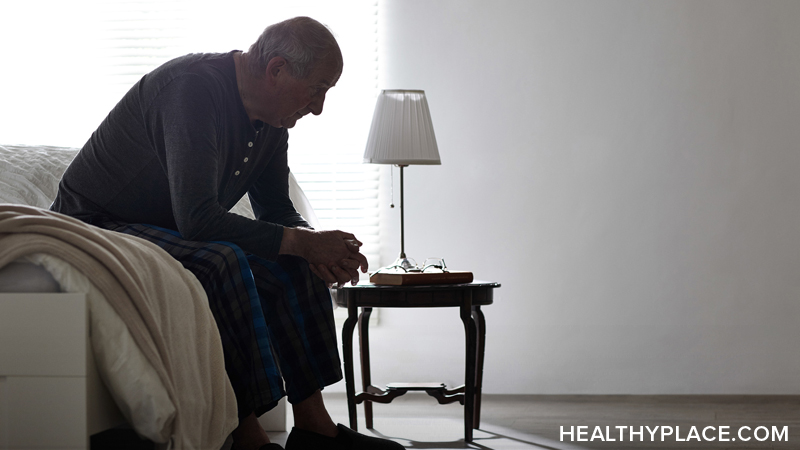Managing Sleep Problems in Alzheimer's Patients

Detailed information on sleep problems in Alzheimer's patients and how to treat sleep problems associated with Alzheimer's Disease.
The nature of sleep changes in Alzheimer's
Scientists do not completely understand why sleep disturbances occur in people with dementia. Sleep disturbances associated with Alzheimer's disease include increased frequency and duration of awakenings, decrease in both dreaming and nondreaming stages of sleep, and daytime napping. Similar changes occur in the sleep of older people who do not have dementia, but these changes occur more frequently and tend to be more severe in people with Alzheimer's disease.
Some people with Alzheimer's disease sleep too much while others have difficulty getting enough sleep. When people with Alzheimer's cannot sleep, they may wander during the night, be unable to lie still, or yell or call out, disrupting the rest of their caregivers. Some studies have shown that sleep disturbances are associated with increased impairment of memory and ability to function in people with Alzheimer's. There is also evidence that sleep disturbances may be worse in more severely affected patients. However, a few studies have reported that sleep disruption may also occur in people with less severe impairment.
Coexisting conditions may intensify sleep problems for older adults with Alzheimer's. Two conditions in which involuntary movements interfere with sleep are periodic limb movement and restless leg syndrome. Other common conditions that disrupt sleep include nightmares and sleep apnea, an abnormal breathing pattern in which people briefly stop breathing many times a night. Depression in a person with dementia may further worsen sleep difficulties
Shifts in the sleep-wake cycle of people with Alzheimer's can be severe. Experts estimate that in the later stages of the disease, affected individuals spend approximately 40 percent of their time in bed awake and a significant proportion of their daytime hours asleep. This increased daytime sleep consists almost exclusively of light sleep that compensates poorly for the loss of deep, restful nighttime sleep. In extreme cases, people with dementia may experience complete reversal of the usual daytime wakefulness/nighttime sleep pattern.
Treatment of Alzheimer sleep problems
Although widely used medications can temporarily improve the sleep disturbances of older adults, a number of studies have found that prescription drugs do not improve overall ratings of sleep quality in older people, whether they are living in their homes or in residential care. Thus, the treatment benefits of using sleep medications in individuals with dementia may not outweigh the potential risks. To improve sleep in these individuals, the U.S. National Institutes of Health (NIH) has encouraged use of the nondrug measures described below rather than medication therapy unless the sleep disturbance is clearly related to a treatable medical condition. It is important that the person experiencing sleep problems be professionally assessed for medical or psychiatric causes for the sleep disturbance before applying any drug or nondrug interventions.
Nondrug treatments
A variety of nondrug treatments for insomnia have been shown to be effective in older adults. These treatments, which aim at improving sleep routine and the sleeping environment and reducing daytime sleep, are widely recommended for use in people with Alzheimer's disease. To create an inviting sleeping environment and promote rest for a person with Alzheimer's:
- Maintain regular times for going to bed and arising.
- Establish a comfortable, secure sleeping environment. Attend to temperature and provide nightlights and/or security objects.
- Discourage staying in bed while awake; use the bedroom only for sleep.
- If the person awakens, discourage watching television.
- Establish regular meal times.
- Avoid alcohol, caffeine and nicotine.
- Avoid excessive evening fluid intake and empty the bladder before retiring.
- Avoid daytime naps if the person is having trouble sleeping at night.
- Treat any pain symptoms.
- Seek morning sunlight exposure.
- Engage in regular daily exercise, but no later than four hours before bedtime.
- If the person is taking cholinesterase inhibitors (tacrine, donepezil, rivastigmine or galantamine), avoid nighttime dosing.
- Administer drugs such as selegiline that may have a stimulating effect no later than six to eight hours before bedtime.
Sleep Medications for Alzheimer's Patients
Drug therapy should be considered only after a nondrug approach has failed and reversible medical or environmental causes have been ruled out. For those people who do require medication, it is imperative to "begin low and go slow." The risks of sleep-inducing medications for older people who are cognitively impaired are considerable. These include increased risk for falls and fractures, increased confusion, and decline in the ability to care for oneself. If sleep medications are used, an attempt should be made to discontinue them after a regular sleep pattern has been established.
The table below lists some of the many different types of medications that can temporarily assist in sleep. The list includes drugs prescribed chiefly for sleep as well as some whose primary use is in treating psychiatric illnesses or behavioral symptoms. Although little is known about the safety and effectiveness of medications for treating chronic sleep disturbances in Alzheimer's, all of these medications are commonly prescribed to treat insomnia and disruptive nighttime behaviors in Alzheimer's disease. All of the medications listed here are available by prescription only and must be used under a physician's supervision. The medication recommended by a physician often reflects the type of behavioral symptoms accompanying the sleep problems.
Some medications commonly used in the treatment of insomnia and nighttime behavioral disturbances in Alzheimer's disease
| Drug category | Examples (generic names) |
The recommended dose in milligrams/day | Potential adverse effects |
| Tricyclic antidepressants | Nortriptyline | 10 -75 | Dizziness, dry mouth, constipation, trouble urinating |
| Trazodone | 25-75 | Dizziness, especially when standing or rising | |
| Benzodiazepines | Lorazepam | 0.5 - 2 | Lethargy, confusion, unsteadiness |
| Oxazepam | 10 - 30 | Dependence | |
| Temazepam | 15 - 30 | Confusion, unsteadiness | |
| Nonbenzodiazepines | Zolpidem | 5 - 10 | Sedation, confusion |
| Zaleplon | 5 - 10 | Sedation, amnesia | |
| Chloral hydrate | 500 - 1,000 | Sedation, nausea | |
| "Classical" antipsychotics | Haloperidol | 0.5 - 1.5 | Parkinson-like symptoms* |
| "Atypical" antipsychotics |
Risperidone | 1 - 6 | Dizziness, especially when standing or rising; nausea* |
| Olanzapine | 5 - 10 | Sedation* | |
| Quetiapine | 12.5 - 100 | Sedation; dizziness, especially when standing or rising* | |
| * Recent studies have linked use of antipsychotic drugs in older adults with dementia to a slightly increased risk of death. The risks and benefits of using these drugs should be carefully evaluated. | |||
This fact sheet is prepared in consultation with the Alzheimer's Association Clinical Issues and Interventions Work Group. The information provided does not represent an endorsement of any medication or nondrug sleep intervention by the Alzheimer's Association.
Source: Sleep changes in Alzheimer's disease fact sheet, Alzheimer's Association, 2005.
APA Reference
Staff, H.
(2021, December 20). Managing Sleep Problems in Alzheimer's Patients, HealthyPlace. Retrieved
on 2025, December 4 from https://www.healthyplace.com/alzheimers/managing-symptoms/managing-sleep-problems-in-alzheimers-patients



